

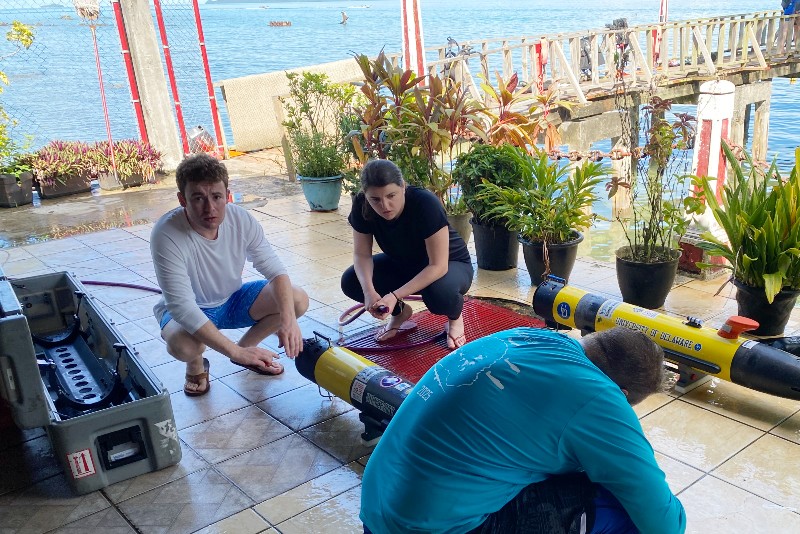
Finding history, healing families
Photos courtesy of Stephen Maister and Mark Moline July 21, 2025
Faculty support allows communication major to pursue a personal passion in a science-based internship
When University of Delaware senior and Wilmington native Stephen Maister was asked if he would do a study abroad trip during his time as a Blue Hen, his response was always a definite “no chance.” He hates to fly long distances and likes being near his family and hometown.
So the communication major never dreamed he would travel for more than two days and 7,100 miles to spend four weeks analyzing photographs of the floor of a lagoon in Chuuk, Micronesia, looking for the wreckage of downed World War II planes and missing American servicemen.
The work was part of a UD-sponsored interdisciplinary internship with Project Recover, a nonprofit organization that uses modern technology to locate and bring home Americans listed as Missing In Action (MIA) since World War II.
“It had nothing to do with my major, it had nothing to do with what I'm doing after college, but this opportunity to go do what they’re doing was once in a lifetime,” Maister said.
A personal mission
Co-founded by Mark Moline, Maxwell P. and Mildred H. Harrington Professor of Marine Studies in UD’s School of Marine Science and Policy, Project Recover includes scientists across the country, along with military experts, historians and many others. Colin Colbourn, UD adjunct professor of history, serves as the lead historian.
Since 2018, Project Recover has identified more than more than 80 U.S. planes, most from World War II, and brought home the remains of more than 30 servicemen, giving families closure many decades later.
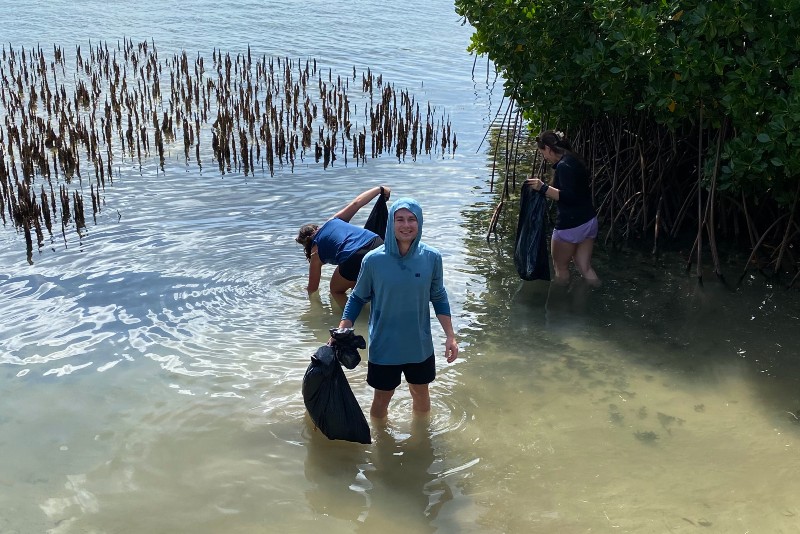
“I am fortunate to be at UD where I am able to integrate with the mission of Project Recover and involve students,” Moline said. “They learn that the wounds of loss in a family endure over generations and that this project is aimed at trying to provide some solace and closure by bringing their lost loved ones home.”
That lesson hit home for Maister. A member of what he calls a “very close and very Navy” family, his uncle was a bombardier-navigator on a naval plane that crashed in the Arabian Sea in 1987. His plane was never found, which Maister said has always been hard on his family, especially his mother, who was in college at the time.
“She never got that closure,” Maister said. “She still talks to everyone he was friends with. She goes to lunch with the woman he was dating at the time.”
His mother learned about Project Recover through a UDaily article and told Maister, who was named after his uncle, about it.
Then, around Veterans Day last fall, “a tough day for my family,” Maister mentioned the nonprofit and his family history to Steve Momorella, instructor of Maister’s public relations writing class. Momorella changed that day’s class assignment, having the students research and write one-page sheets about the group.
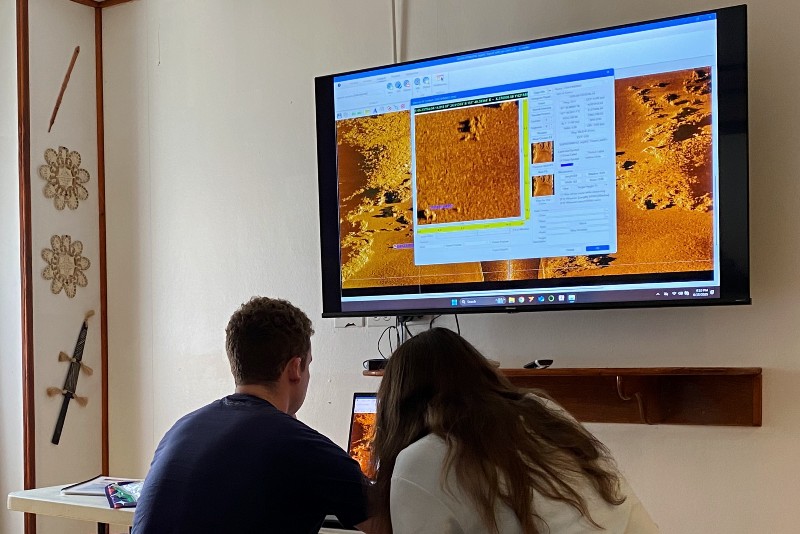
“It was emotional seeing people doing this beautiful work for veterans,” Maister said. “The fact that he dropped his whole lesson plan for the day meant the absolute world to me.”
After becoming what he calls “obsessed” with Project Recover, Maister applied for the internship. Momorella wrote his recommendation letter.
“I probably wouldn't have jumped on this as much as I did without the support of him and others in the communication department,” he said.
Doing the work
During World War II, the Chuuk lagoon, a large body of water about a third of the size of Delaware, was the main naval base for the Japanese fleet and the site of a major air attack by US forces in 1944. Before the 2025 trip, Project Recover had already found four American planes and Moline said they knew of 20 more.
In Chuuk, Maister and the other seven students on the trip divided their time between scientific research using various equipment to scan the seafloor and a new machine learning approach to reviewing the data, and learning the history, culture and natural environment of the area. They toured a couple of islands, seeing the remains of buildings that were bombed during the war and walking on old runways that are still there 80 years after its end. They learned local customs and a few words of the language.
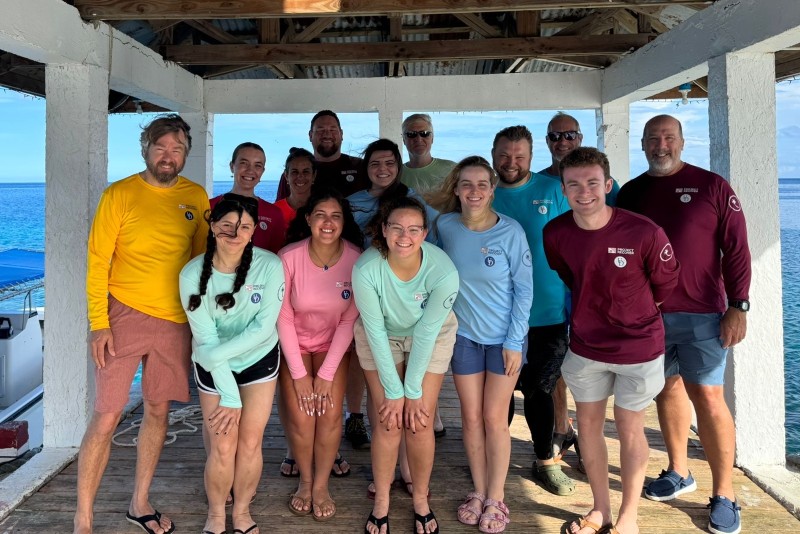
“We all have to work together to solve the puzzles [of finding the missing planes]," Colbourn said. “We are here as a guest in this small group of islands and, and while we're doing U.S. history, we're in Micronesia. It’s their history too, and their lagoon.”
Despite the lack of a scientific background, Maister learned every aspect of the work, and soon began analyzing data from previous trips and processing new data collected by the team. The days were long and full of hard work.
“We would look over the pictures of the sea floor for hours. At first I thought I bit off more than I could chew, but when I started to get used to it and really learn it it wasn’t too complicated,” Maister said. “The teachers were amazing and did a lot of one-on-one teaching. If I had a question, they would break everything down for me. After the first few days I felt really good about it.”
Two weeks into the trip, after finding several Japanese planes, the team found the wreckage of an American plane. They found another before the trip ended, which is incredibly rare according to Colbourn. Each discovery was followed by a flag folding ceremony where the team recounts the plane's mission, and folds an American flag to honor the men who were on board.
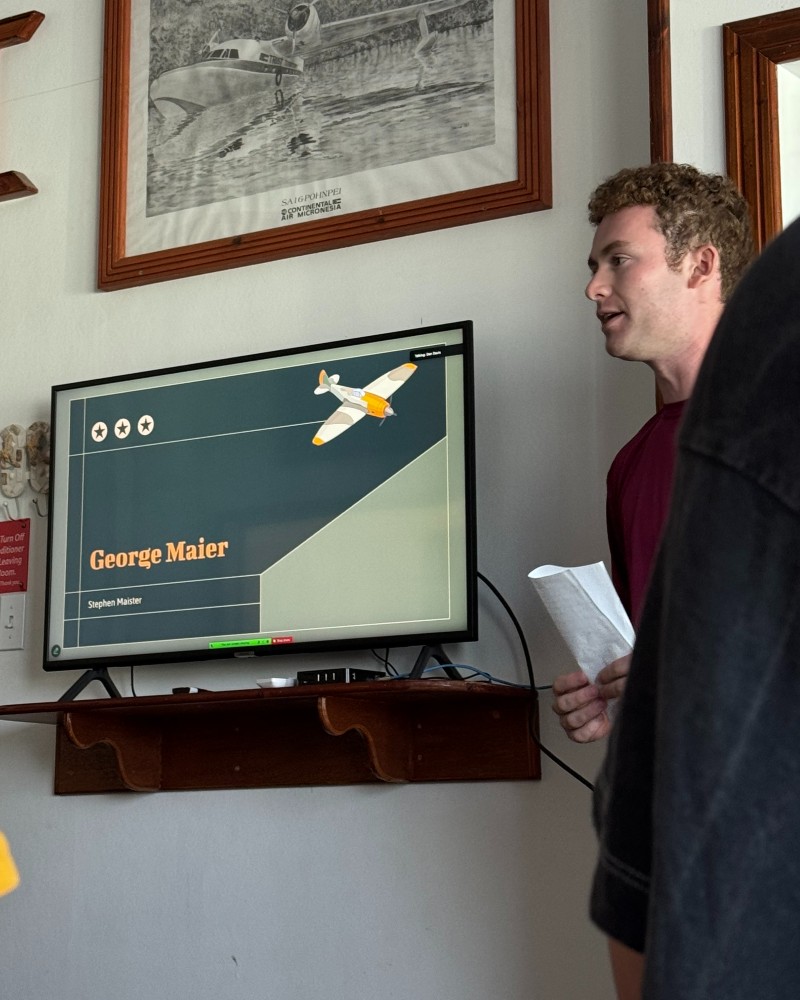
For his final project Maister used his storytelling and communication skills to “give life” to one of the servicemen still missing in the area. He focused on George Maier, a missing airman from Philadelphia whose plane crashed outside the lagoon. He also talked about his uncle and the impact his passing has had on his family.
“His story brought to life what it means to families to bring an MIA home,” Moline said. “It was emotional for the group.”
Beyond the lagoon
Moline said the internship is designed to boost students’ confidence, allow them to clarify their career goals, and meet a new network of people that will support their future goals, regardless of major.
“It’s really getting to work, learning how to do new things and then coming up with something on your own to share with the rest of the group as a final project. Anyone can do that,” Moline said.
The internship may be over, but Maister said he will continue to be involved with Project Recover.
“I hope we can bring my Uncle Steve home, and Project Recover has motivated me to try and help other families. They have been waiting and wondering for a lot longer,” he said.
Contact Us
Have a UDaily story idea?
Contact us at ocm@udel.edu
Members of the press
Contact us at mediarelations@udel.edu or visit the Media Relations website

